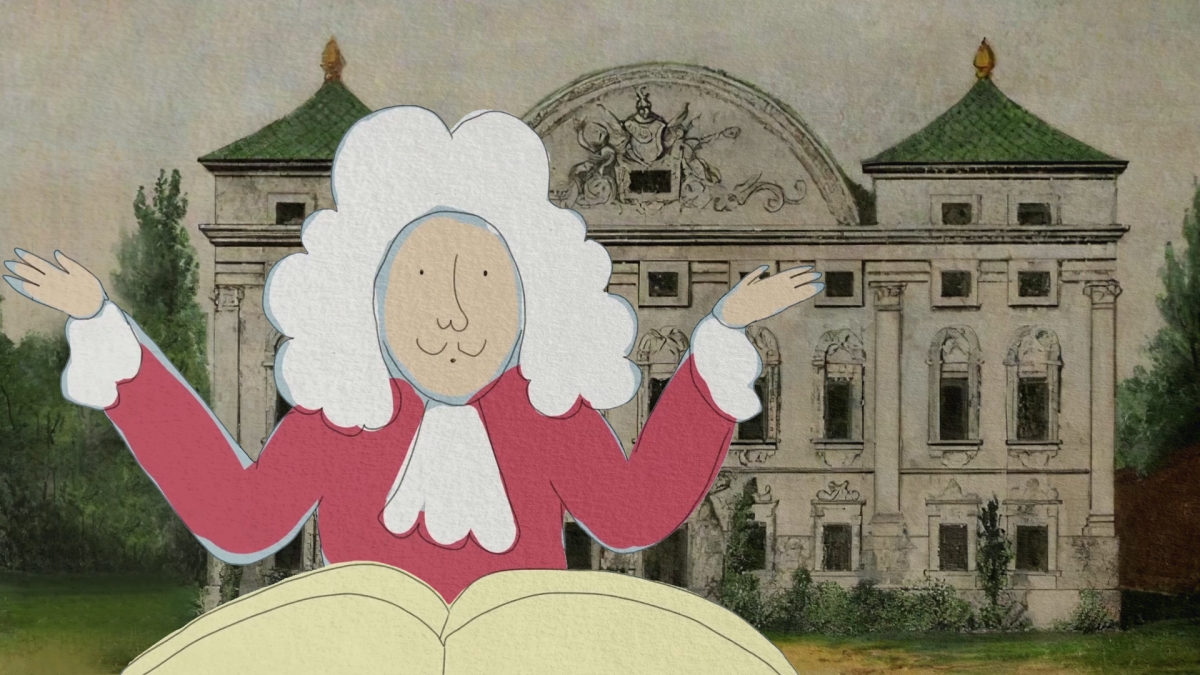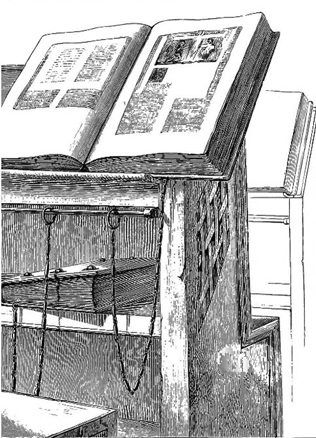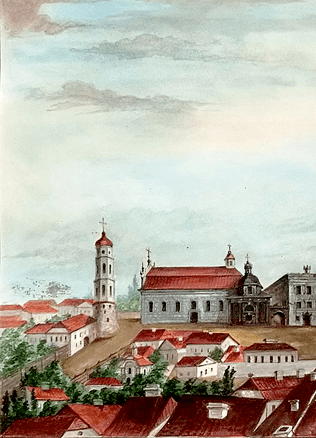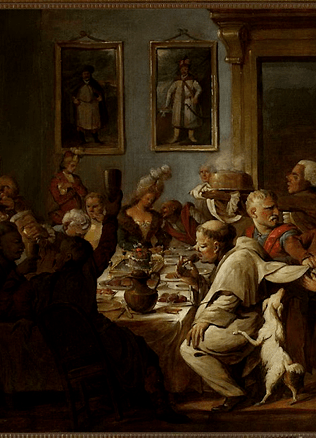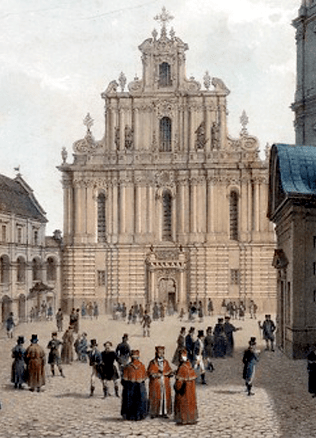Excommunication of Kazimierz Jan Sapieha in 1694
At the end of the 17th century the magnate family of the Sapieha acquired an enormous influence in the Grand Duchy of Lithuania, Two brothers – the Grand Hetman of Lithuania and the Palatine of Vilnius Kazimierz Jan (lit. Kazimieras Jonas) and the Grand Treasurer Benedykt Paweł Sapieha (lit. Benediktas Povilas Sapiega) – controlled the Lithuanian army and the Treasury, could impose their will not only on the nobility but also on other noblemen, prevented King Jan Sobieski from pursuing his home and foreign policy unrestrictedly. In the long run the Sapiehas’ power and frequent abuses caused dissatisfaction of the nobility and other noblemen who were dissatisfied with the absolute power of the Sapiehas.
The war of giants: bishop’s ecclesiastical wrath against Sapieha’s secular arrogance
The nobility was especially unhappy with the obligation to maintain the units of the Lithuanian army during the winter in the state (royal) holdings given over to them to manage. Larger holdings were called elderships. At that time the Commonwealth of the Two Nations (the joint Polish and Lithuanian State) was at war with Turkey (1683–1699), therefore the army was large. The burden of its maintenance impoverished the state holdings. Seeking to find new possibilities to maintain the army in winter Kazimierz Jan Sapieha, following the example of his predecessors, the Grand Hetmans, located a part of the military units in the ecclesiastic rather than state holdings – in the holdings of the Bishop of Vilnius. Law of that time did not regulate strictly in what ecclesiastical holdings it was possible and in what holdings it was impossible to allocate places for the army to spend the winter. The Hetman was convinced that he had the right to locate his army for the winter season in those holdings, which the Rulers presented to the church, and he could not locate it in the holdings presented to the church by the nobility. Vilnius Bishop Konstanty Kazimierz Brzostowski (lit. Konstantinas Kazimieras Bžostovskis) thought differently – he demanded that on the whole the places to the army for the winter season should not be allocated in the holdings that belonged to the church. The quarrel was made even fiercer by the fact that the Sapiehas and Vilnius Bishop belonged to the opposite political camps. The disagreement that was quite common in those times concerning the obligations to the army became a violent political clash. Brzostowski was a supporter of King Jan Sobieski, supported the idea that the Commonwealth of the Two Nations should withdraw as soon as possible, even without the approval of the allies, from the war with the Turks. The Sapiehas opposed to the unilateral withdrawal from the anti-Turkish union.
Having failed to resolve his case with the Hetman either in the Sejm of the state or in court (the Supreme Tribunal of Lithuania), Vilnius Bishop resorted to the extreme measure – on 18 April 1694, during the solemn ceremony held at Vilnius Cathedral, he excommunicated the Grand Hetman of Lithuania Kazimierz Jan Sapieha (officially said that he could no longer be a member of the Roman Catholic Church) “with all the assistance, counsellors and executors to his behaviour (with the exception of all the officers of the knight estate)”. In announcing the excommunication, the most severe of all possible punishments provided for by ecclesiastic law, candles were thrown on the floor of the Cathedral. At the same time Sapieha assuredly ignored excommunication, during the time it was being announced, in his palace in Antakalnis he arranged an admission to the Supreme Tribunal in Vilnius for the nobility and the noblemen who arrived in Vilnius.
The last word is vested in the Pope
“
All most important forces of that time – the King, the senators, the military authorities, other bishops, the Pope’s envoy to the Commonwealth of the Two Nations – the Nuncio, and finally the Pope himself – tried to resolve the quarrel between the Bishop and the Hetman.
All most important forces of that time – the King, the senators, the military authorities, other bishops, the Pope’s envoy to the Commonwealth of the Two Nations – the Nuncio, and finally the Pope himself – tried to resolve the quarrel between the Bishop and the Hetman. Lithuania’s clergy – the priests, the senior of the monastic institutions, which had to choose between the obedience to the Bishop and loyalty to the Sapiehas because many churches and monasteries used their financial assistance found themselves in a tricky situation. The Bishop imposed an ecclesiastical punishment on the seniors of the monastic institutions that operated in Lithuania who regarded the Sapiehas with favour. All the rest three chief commanders of the army expressed support of the Hetman – both Hetmans of Poland and the Lithuanians Field Hetman Józef Bogusław Słuszka (lit. Juozapas Boguslavas Sluška), though he belonged to the camp of Sapieha’s opponents, the supporters of the King. The Nuncio of the Pope supported Vilnius Bishop, and the highest hierarch of the Polish and Lithuanian Catholic Church, the Archbishop of Gniezn (called primate), due to political motives supported Sapieha – he renounced the excommunication announced by Vilnius Bishop. Vilnius Bishop did not recognise this revocation. The King was more favourable to Vilnius Bishop. Because of the quarrel that broke out in 1693–1695 two Sejms were discontinued.
“
Because of the quarrel that broke out in 1693–1695 two Sejms were discontinued.
In 1696, upon the death of King Jan Sobieski, the Pope tried to reconcile Vilnius Bishop and the Hetman. On 6 October 1698, in Warsaw, an agreement between Kazimierz Jan Sapieha and the Pope’s Nuncio was concluded, and soon the Pope confirmed the agreement. The excommunication was recalled, the Hetman was found not guilty, and Vilnius Bishop was forbidden to announce excommunications to the ministers of Lithuania in the future without obtaining the advance approval of the Pope. The Bishop’s holdings, which suffered losses because of the army, were granted relief from the obligations but after the term of the reliefs expired (two years) the Hetman was given the right to appoint a place for one army to spend the winter in. Brzostowski who was in Rome at that time recognised the agreement, returned to Lithuania and later got on quite well with Sapieha.
Though eventually Sapieha won that quarrel the excommunication did great harm to his authority, encouraged many noblemen to pose a challenge to the most influential family and speeded up the downfall of the Sapiehas’ hegemony in Lithuania, which came quite soon – in 1700.
Gintautas Sliesoriūnas
